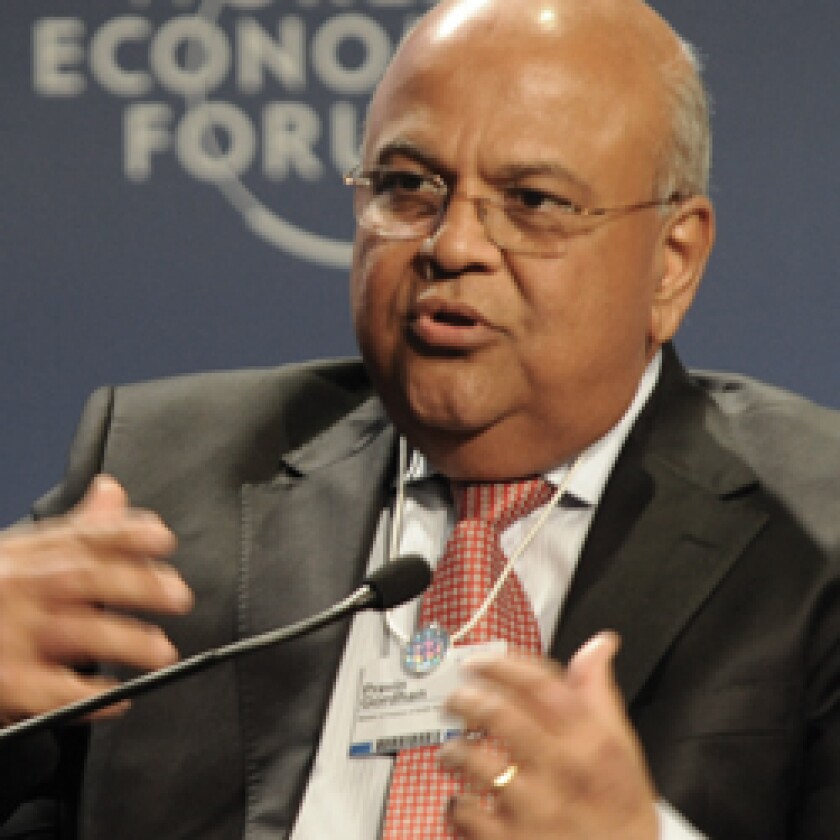The prudent fiscal policy led by Pravin Gordhan, who became finance minister in 2009 at the height of the global economic crisis, has been praised by analysts, especially since South Africa is more exposed than other emerging markets to dangers stemming from an eventual pullback of quantitative easing by the Federal Reserve.
“Overall he’s managed a variety of competing issues,” Peter Attard Montalto, emerging markets economist at Nomura, tells Emerging Markets. Gordhan took the advice on spending restraint voiced by various experts on board and “was able to push that out and get that [spending restraint] accepted in Cabinet, and we saw that in terms of the budget last year. I think investors do respect him for managing a difficult set of political challenges,” Montalto adds.
Phoenix Kalen, Demetrios Efstathiou and Mohammed Kazmi, analysts with RBS, noted after a visit to South Africa in April that budget revenues had “surprised on the upside, while at the same time there has been some under-spending” and that the Treasury “intends to keep the fiscal buffer stable”. Tax collection in the fiscal year that ended on March 31 was 814 billion rand ($88.4 billion), exceeding estimates of 810.5 billion rand. The budget deficit ended the year at around 5% of gross domestic product.
In an assessment published this month, IMF experts welcomed the South African authorities’ “commitment to remain within the medium-term expenditure ceilings”. They also “commended the authorities’ commitment to long-term fiscal discipline and welcomed ongoing reforms to improve spending efficiency”, the IMF said in a statement.
However, the IMF experts warned that the balance of risks for the country was still “tilted firmly to the downside”, with the main risk being a prolonged stop in capital inflows and a “disorderly adjustment” in the budget and capital account deficits. They also noted that lower growth in recent years had aggravated the country’s already high unemployment and inequality.
Shilan Shah, Africa economist at Capital Economics, has identified positive signs for growth in recent data out of South Africa. The manufacturing Purchasing Managers Index (PMI) hit a six-year high of 56.5 in August, after having been above the “theoretical divide” between contraction and expansion of 50 for five consecutive months. However, Shah says, past data suggest that for South Africa a reading above 45 for the index is consistent with rising manufacturing production.
In September, the PMI fell back to 49.1 but “following strong readings in the previous two months, it is likely that the manufacturing sector recorded decent growth in the third quarter as a whole,” Shah wrote in a note after the release of the data on October 1. The weaker rand and a continued improvement in the outlook for the eurozone should give a boost to South African manufacturers, he says, but warns that wage negotiations continue to take place in the mining sector, and the chance of strikes is “still relatively high”. —Antonia Oprita
EM INTERVIEW Boosting economic growth “so we can deal with the twin challenges of unemployment and poverty” is the biggest challenge for South Africa this year, finance minister Pravin Gordhan tells Emerging Markets. In order to be able to do this, the South African government will focus its efforts on “resolving the energy constraints, increasing investment in infrastructure, improving the regulatory environment, stimulating agricultural development, increasing prospects for youth employment and intensifying efforts for the development of small and medium-sized enterprises”, he says, adding: “Equally, navigating the current turbulence and building on the many new opportunities is an important task.”
For Gordhan, the main source of insecurity facing the global economy is still the continuation of the eurozone crisis. “Although South Africa’s exports to Europe have fallen off their peak, Europe remains an important destination for our exports,” he says. “Some countries are, for example, important importers of our mining products such as platinum and base metals, which are primarily used in the production of catalytic converters. These countries are also key consumers of manufactured goods such as machinery and electrical equipment, as well as vehicles and transport equipment. However, we live in a period where we have an unfortunate convergence of a number of troubling trends. We require a renewed effort to shift our global focus to inclusive and sustainable growth and job creation.”
Gordhan calls on the IMF to set the creation of a “durable and broad economic recovery” as its main priority. To achieve this, measures such as fiscal and monetary stimulus in countries which have the space to do it are needed, as well as the completion of a banking union with the purpose of ending the eurozone crisis.
The IMF must also “both increase its representativity and play a bigger role in helping coordinate actions across the globe to temper turbulence and minimize spillovers” and contribute to a wider understanding of the interdependence between advanced and emerging markets.
Last but not least, the fund should advocate for policies to increase growth, Gordhan says. “Without economic growth, it will be difficult to reduce poverty and increase employment. In addition, it will be much easier to carry out necessary structural reforms in a growing economy.” —A.O.
